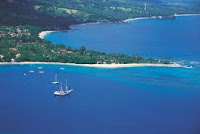Health and safety are top concerns for tourists when travelling abroad. Here are a few tips to help you on your trip through Indonesia.
Money
The official monetary unit of Indonesia is the Rupiah.
It is possible to exchange money at bank counters upon arrival at international airports or seaports. In town, most of the foreign currencies can easily be exchanged at banks and authorised money exchange counters. ATM’s are widely available everywhere for cash operations, even in smaller cities.
Health
The areas that most visitors want to go to are safe for travel for health conscious tourists. Malaria today is eradicated in all urban areas and most of the large tourist areas. Malaria transmission can occur after dark in rural, forested areas not usually frequented by tourists, except in Papua (formerly known as Irian Jaya), where risk is widespread.
However, over the past few years, malaria cases have been observed in Central Java Province. Insect protection measures (anti-mosquitoes cream or lotions) are advised against mosquito-borne diseases like malaria or dengue fever. They are available in any pharmacy or drugstore in Indonesia. The country also has a large number of well-equipped hospitals to international standards, especially in the largest cities and tourist areas.
Safety
Indonesia is an exceedingly safe country for foreign tourists and Indonesians will take pride and happiness to help and give their best to a traveller. However, as in any country in the world, in big cities such Jakarta, Surabaya or very popular tourist areas like Bali or Yogyakarta, it is advisable not to go out carrying too much cash or flashing expensive jewellery. To travel within a city, use only taxis with the name of the company. They are all equipped with meters.
Which destinations to visit?
Indonesia and is fully open to foreign visitors. The regions receiving the most tourists are currently Bali, Java, Lombok, Sumatra, Sulawesi and the islands of Batam and Bintan across Singapore.
Indonesia and is fully open to foreign visitors. The regions receiving the most tourists are currently Bali, Java, Lombok, Sumatra, Sulawesi and the islands of Batam and Bintan across Singapore.
 |
| Lombok island |
As Indonesia is the world’s largest archipelago, events happening in one specific part of the country do not mean that the whole Indonesia is affected. For example, the tsunami disaster affected only the Northwestern tip of Sumatra island in Aceh. In Bali, Yogyakarta, Jakarta or even in the rest of Sumatra, life continued normally.
In case of any event, the Indonesian embassy will be able to present detailed information on the affected zone. Media will also be able to contact the Ministry of Culture and Tourism to get the most updated information as well as a map of the affected areas. A list of the regions which might pose a threat to the safety of visitors is available from the Ministry of Culture and Tourism.
Visas
All travellers are welcome to Indonesia. However, in most cases, travellers must obtain a tourist visa to enter, and for many countries these can be issued at the airport on arrival upon payment of a small administrative fee.
Visitors fit into one of three categories: a few countries (mostly ASEAN) where visas are not necessary; countries whose citizens can obtain with visas on arrival (VOA); and remaining countries where it is necessary to first obtain a tourist visa from the nearest Indonesia embassy. All visitors to Indonesia must ensure that their passport has a validity of at least six months.All travellers are welcome to Indonesia. However, in most cases, travellers must obtain a tourist visa to enter, and for many countries these can be issued at the airport on arrival upon payment of a small administrative fee.
Countries which are entitled to a Visa-on-Arrival (VOA) facility: There is in total a list of 64 countries which are eligible to to obtain a VOA. Australian and New Zealand passport holders are included in this list and can purchase a single 30-day VOA for a fee of US$25 at their point of entry . This visa may be extended for a further 60 days on application. To expediate immigration processes it is highly recommended to pay the visa administrative fee using US dollars.
For more details on Indonesian visa requirements and to obtain a list of the countries eligible for a visa-on-arrival contact your local Indonesian Consulate:
America: http://www.embassyofindonesia.org/
England: http://www.indonesianembassy.org.uk/
Japan: http://www2.indonesianembassy.jp/
Canada: http://www.indonesia-ottawa.org/
Climate
Indonesia's climate is tropical. There is no Autumn or Winter and distinctive "dry" and "wet" seasons share the year. The East Monsoon, from June to September, brings dry weather while the West Monsoon, from December to March is moisture laden, bringing rain. Temperatures range from 21 degrees to 33 degrees celcious except at higher altitudes which can be much cooler. Heaviest rainfalls are usually recorded in December and January and humidity is generally between 75% and 100%.
Indonesia's climate is tropical. There is no Autumn or Winter and distinctive "dry" and "wet" seasons share the year. The East Monsoon, from June to September, brings dry weather while the West Monsoon, from December to March is moisture laden, bringing rain. Temperatures range from 21 degrees to 33 degrees celcious except at higher altitudes which can be much cooler. Heaviest rainfalls are usually recorded in December and January and humidity is generally between 75% and 100%.


0 komentar:
Posting Komentar